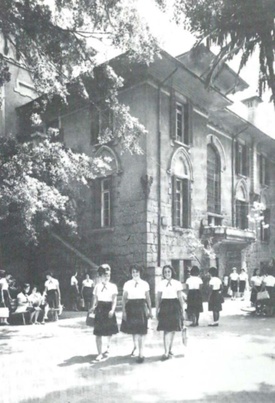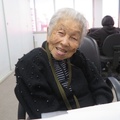During the war, students were ordered to evacuate after their Japanese language documents were confiscated.
June 20th: "There have been frequent incidents in which students' documents have been confiscated by the authorities over the Japanese language and other matters, and there is also the fear of searches of the school and its premises, so it has been agreed at a staff meeting to exercise restraint in the future. Until now, Director Akama and Professor Kanno have worked hard every time and have managed to avoid any incidents."
Because Japanese language education continued secretly even during the war, there was uproar throughout the school when a student accidentally had his teaching materials confiscated by the authorities.
July 14th: "The following directives were issued regarding the school eviction issue: (1) The principal will be a Brazilian. (2) No boys will be allowed to live there. (3) An interventora (female coach) will be appointed."
October 31st: "Regarding the issue of eviction from the school building, the landlord of the school building changed in July of last year, and since then, we have been receiving requests to vacate the building one after another. However, since we are officially renting the school building under a five-year contract, we have the right to live there for another two years, so we have filed a lawsuit and are waiting for the decision."
December 6th: "Sudden eviction order. Early in the morning, a large moving truck arrived at the Tamandare campus, and a court order was issued for immediate forced eviction. With no idea where to go, the staff searched everywhere for a new place to move to, and at 3pm they finally managed to rent 235 Bergeiro Street, and began moving. The events of the day had caused great concern for Principal Akama and the entire staff, and it was heartbreaking to think about."
December 20th: Graduation Ceremony. In the midst of many hardships and difficulties, "the light of fireflies, the snow on the windows, and the graduation ceremony for the teacher training course after three years of hard work" was a truly moving and tearful graduation ceremony.
December 25th: "Establishment of the Alma Mater Support Association. Sensing that the school would have to operate two buildings next year (due to the move) and would be in financial difficulty, alumni and staff volunteers decided to establish the Alma Mater Support Association. The meeting was attended by alumni leaders who came out of their determination to see their alma mater dedicated to educating women despite the war."
Naturally, since gatherings of Japanese people were prohibited at the time, all of this was done in secret. This shows just how intense the passion for educating children was, even during wartime. However, this was not the end of the difficulties. For some reason, there is no mention of 1943 in the timeline.
Finally, the school was ordered closed
[1944]
January 8th: "Authorities search the school's home. An article with a photo of the school appeared in the newspaper. The headline was, "In the center of Sao Paulo, there is a school with 300 students that is the mastermind behind the promotion of the Japanese spirit. How negligent is the educational authorities?" That night, the authorities surrounded the branch school and searched the home, but they left as they found no evidence."
March 3rd: "Three detectives raid the school on Girl's Day. On the night of Girl's Day, the students' cheers must have been heard, as the three detectives raided the school. The dreams of the kind students were shattered, but they had no choice but to accept that this was also the season for the crime."
August 15th: School inspector Dona Susana suddenly visits the school. While inspecting the sewing class, she discovers a student's sewing notebook written in Japanese characters, which is unfortunately confiscated. Until now, the school has managed to avoid having evidence of Japanese characters confiscated, but finally the school is ordered to close.
August 20th: "Staff emergency meeting. An emergency meeting was held and it was sadly decided that Japanese language classes would be suspended until the time came. Only boarding students would be allowed to continue classes, but only for the purpose of self-studying sewing."
October 10th: Approval for the establishment of a new school has been granted. Although we thought we would be able to open within a week or two, we faithfully followed the orders for about two months, and perhaps every time an inspector came by, he felt sympathy for the quiet school building, because today the license was officially granted and the school was renamed "Escola Bergeiro," and the long-awaited day arrived.
October 21st: All departments are working hard to make up for the two-month gap in classes.
[1945]
August 15th: "The Imperial Rescript on the End of the War was received. The Emperor broadcast the Imperial Rescript on the "Acceptance of the Portsdam Declaration." All staff and students listened to it. The students returned to their lodgings and burst into tears."
The story of Mizukami-san mentioned at the beginning was only one line in the chronology. What I think from this is that there are many more anecdotes hidden in each line of the description in this chronology.
Michihe's thoughts on "Seeds that are not sown will not grow"
Three years after the end of the war, Akama Michie included the following passage in the “Recent Thoughts” section of the eighth issue of the newsletter, published in December 1948:
"Seeds that are not sown will not grow" is an extremely vulgar saying, but it really strikes a chord with me.
As life becomes more complicated, various events, both good and bad, occur one after the other, day after day. If you look closely at the origin of one of these events and think back further, you will realize that you have been creating its cause for many years.
When I look back on my past life, I can't help but feel that I made more mistakes, big and small, than I did good things.
This may be a comment that looks back on the fact that the struggle for victory or defeat was also a result of the education system before and during the war.
After the war, the school decided to reorganize as a foundation in September 1958, due to the harsh experiences of the Akama family. At that time, the Akama family donated all of their personal assets to the foundation. It was the first school in Colonia to be officially recognized by the Brazilian government, and the first to be incorporated as a foundation. This was based on the idea that "the school would last longer if it became public property, rather than the property of the Akama family."
In the "Joy and Gratitude" section of the "50th Anniversary History of Akama Gakuin," Chairman Akama Michihe explained the reason for the early foundation as follows: "In short, my goal was to improve the ideal education and management of the school, and to ensure its continued existence, without my personal control. It is said that "it is rare for a private business run by immigrants to continue for three generations," and while it is true that when it comes to their grandchildren and great-grandchildren, they may make another leap forward from their predecessors, I know that there are also cases where the business tapers off and eventually disappears. However, a corporate organization has ties to the government.
This is not just a matter for my son or grandson, but will be passed on by influential members of the organization, not an individual matter. Moreover, since the school is one of the important cultural projects for the nation, it is not something that can be easily influenced, so I took the plunge.
Michihe-san's point that "it is rare for immigrants' private businesses to continue for three generations" is an undeniable reality. I admire his foresight in facing this reality and taking action immediately after the end of the war.
Looking back at the writings of Michie, the words that best expressed her state of mind were in the fifth issue of the journal Yamato (November 1940), "Even floating plants without roots in water can find a place for fireflies for a night." When I looked it up, I found that it was the lyrics of a song called Oki Isobushi, about a remote island in Nagasaki Prefecture. Perhaps she had heard it from people from the same prefecture, such as Baba Nao.
"Floating weeds" and "rootless weeds" are words often used to mock the way immigrants live after leaving their hometowns. Even if they are rootless in their new home, they want their children to put down roots there. Before and during the war, education was given mainly to put down roots in Japan, but after the war, it changed drastically to be more oriented towards Brazilian society.
The first generation is a floating weed, and the second generation is a firefly that is raised on top of it, and sent off on a journey. Isn't this a phrase that overlaps with the fate of immigrants?
*This article is reprinted from the Brazil Nippo (August 15, 2023).
© 2023 Masayuki Fukasawa






